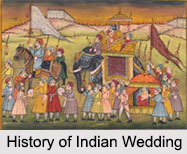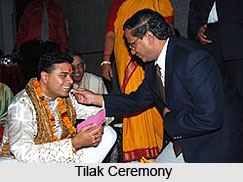Dowry System in Indian Marriages can be called the commercial aspect of the marriage. The practice of giving dowry was very common among all people of all nations. A girl gets all the domestic utensils that are necessary to set up a family. Dowry system in India was prevalent since the Vedic period. In Epic period gifts from parents, brothers and relatives and relatives were recognized as woman`s property - stridhan. According to Kautilya "Means of subsistence or jewellery constitutes what is called the property of the woman. it is no guilt for a wife to make use of this property in maintaining her son her daughter-in-law or herself if her absent husband has made no provision for her maintenance".
Dowry system was widespread in the Vedic period. In Epic period, gifts from parents, brothers and relatives were accepted as woman`s property or stridhan. According to Kautilya, all the means of survival or jewellery constitutes is called the property of the woman. A wife do not carry any guilt to make use of this property in maintaining her son, her daughter-in-law or herself, in case of her husband`s absence or his state of poverty, she do not worry about her and her children`s maintenance.
The system is burdened for the father of the girl and it needs no mention of the evils. Often the father of the girl commits suicide, because he fails to arrange for the dowry demanded by the parents of the boy. Sometimes the girl herself commits suicide for the same reason; years have passed but the reason prevails in modern India till date. Due to dowry system, the parents are sometimes bound to marry the girl to a man, who is almost of her father`s age. The parents sometimes commit cheating or forgery, to arrange the dowry in order to get their daughters married. Many instances in the history of India, shows that the girl remains unmarried, because of the dowry demanded is too high to meet.
Considering the problems of dowry system, The Dowry Prohibition Act 1961 was approved. According to the Act, if a person gives or takes dowry, he is immediately liable to be punished for an imprisonment and fine. If a person directly or indirectly demands dowry from the guardians of the wife after the marriage has been fixed, then such a person is likely to be punished for an custody of six months and a fine of Rs 5,000.
According to this Act, any agreement entered into with a responsibility of taking or giving of dowry is unacceptable. A dowry is received for the advantage of the wife or her descendant, has to be transferred to the name of the wife, otherwise it is liable to be punished under the Act. Under the existing practice, parents give their daughters all household furniture, kitchen utensils, clothes, cash, bedstead, jewels and other necessary articles, but these should be without any demand or compulsion.
All parents try their best to give their daughters all the pleasures and necessities that comprise the materialistic wants, but making it mandatory or forcible is against law. However, still we ample crimes on the basis of murder of the brides, because the husbands in collaboration with his parents makes the demands, particularly the mother in law. Demands for vehicle or cash money for business or for higher education are some of the common wants of the bridegrooms.
Not being able to meet the demand, some brides are even burnt alive or divorced on some other pretext showed to the government and court. Sometimes the wives are treated like servants and slaves. The dowry, was given, exhibited and showed to all.
More on Indian Marriage Customs
More on Indian Wedding Accessories
More on Indian Religious Weddings
More on Types of Marriages
See also



















